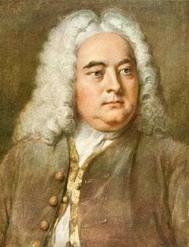Annotation:March in Scipio: Difference between revisions
(Created page with "=='''Back to [[{{BASEPAGENAME}}]]'''== ---- <p><font face="garamond, serif" size="4"> '''MARCH IN SCIPIO.''' English, March (whole time). D Major. Standard tuning (fiddle). AA...") |
No edit summary |
||
| Line 2: | Line 2: | ||
---- | ---- | ||
<p><font face="garamond, serif" size="4"> | <p><font face="garamond, serif" size="4"> | ||
'''MARCH IN SCIPIO.''' English, March (whole time). D Major. Standard tuning (fiddle). AAB. | '''MARCH IN SCIPIO.''' English, March (whole time). D Major. Standard tuning (fiddle). AAB. The popular march tune was published in numerous latter 18th century tutors and march collections, including Robert Bremner's '''A Collection of Airs and Marches''' (London, 1761, p. 32), John Johnson's '''The Compleat Tutor for the German Flute''' (London, 1760, p. 23), and Thomas Bennett's '''Compleat Tutor for the Fife''' (London, 1770, p. 22). | ||
<br> | |||
<br> | |||
[[File:handel.jpg|200px|thumb|left|George Frideric Handel]] | |||
'''Scipio''' (1726) was an opera in three acts with music by George Frideric Handel. The libretto was written by Paolo Antonio Rolli, based on a libretto by Antonio Salvi and on the histories of Livy. It was first performed at the King's Theatre, London, in March, 1726. Handel had just become Kapellmeister to George, Elector of Hanover. When the Elector was crowned King George I in 1712 Handel traveled with him to London, where he settled. He later became a naturalized English British subject. | |||
<br> | |||
<br> | |||
"March in Scipio" has been the Regimental Slow March of the British Grenadier Guards since the 18th century. | |||
<br> | <br> | ||
<br> | <br> | ||
Revision as of 03:33, 29 April 2014
Back to March in Scipio
MARCH IN SCIPIO. English, March (whole time). D Major. Standard tuning (fiddle). AAB. The popular march tune was published in numerous latter 18th century tutors and march collections, including Robert Bremner's A Collection of Airs and Marches (London, 1761, p. 32), John Johnson's The Compleat Tutor for the German Flute (London, 1760, p. 23), and Thomas Bennett's Compleat Tutor for the Fife (London, 1770, p. 22).

Scipio (1726) was an opera in three acts with music by George Frideric Handel. The libretto was written by Paolo Antonio Rolli, based on a libretto by Antonio Salvi and on the histories of Livy. It was first performed at the King's Theatre, London, in March, 1726. Handel had just become Kapellmeister to George, Elector of Hanover. When the Elector was crowned King George I in 1712 Handel traveled with him to London, where he settled. He later became a naturalized English British subject.
"March in Scipio" has been the Regimental Slow March of the British Grenadier Guards since the 18th century.
Source for notated version:
Printed sources: Thompson (Compleat Tutor for the Fife), 1760; p. 18.
Recorded sources:
